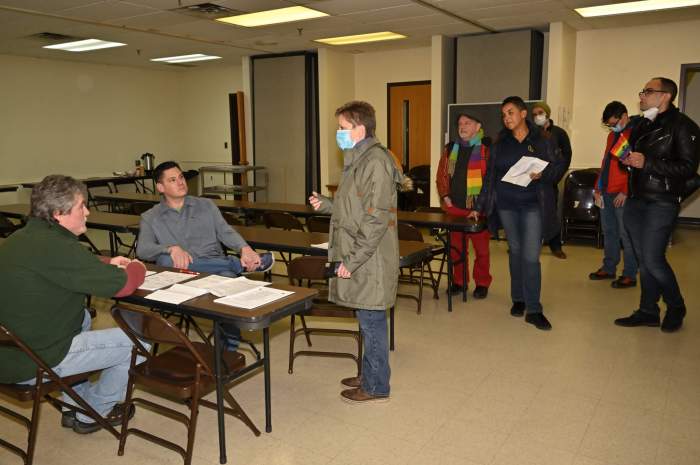By JERRY TALLMER
In the summer of 1964 I spent a few weeks in London on a Ford Foundation grant to look at theater there. It was my first trip ever to that great city, the seedbed of everything in what might be called our own culture, the American culture, American civilization.
All these years later I don’t remember much about the theater there that summer — except for Patrick Magee and Glenda Jackson in Peter Weiss and Peter Brook’s stunning “Marat/Sade.” But I have total recall of the deep shock of my first exposure to the vileness and trashiness and smug imbecility of each and all of the huge-selling British tabloids — the weekly News of the World not least among them. I don’t know who owned it then, not Rupert.
Every day on every page these gruesome gossip sheets violated almost everything I knew, or thought I knew, about journalism. I should, in fact, have known better; I had read and laughed my way through Evelyn Waugh’s “Scoop,” and a young British colleague on the Village Voice — a refugee from Fleet Street — might himself have been a character out of “Scoop,” or out of a Tom Stoppard play then yet to be written.
Rupert Murdoch was born March 11, 1931. The summer of ’64 he was 33 years old. Hardly anybody in England had then ever heard of him, and I certainly had never heard of him.
In the fall of 1977 I stood with my colleagues on the floor of the city room of the New York Post and listened to Rupert Murdoch addressing the troops in person. Us troops. He had just bought the paper from Dorothy Schiff, and now he said, as best my memory has it: “You have read and heard a lot about me in the press, all of it wrong. I’m not going to change a thing on this newspaper. Don’t listen to what anybody says. Just watch what we do.”
The next day he started to change everything, beginning with dropping the back-page folio so the thinness of the paper wouldn’t jump out at you. The second thing he did was to kill the edit-page cartoons of Pulitzer Prize winner Herblock (Herbert Block) for being too liberal.
It wasn’t long until the Post installed a British-tabloid-type, snoop-and-celeb-mad Page Six, an institution commanding more obeisance than it has ever deserved — except from press agents — that day to this.
And that day to this, one of Murdoch’s chief goals with The Post — an intense, emotional goal — has been to drive the rival Daily News out of business. Two tabloids at one another’s throats, battling for circulation — and advertising — by hook or crook.
I was once talking schedules with a New York Post assistant editor named John V. when Rupert Murdoch blew into V.’s cubicle in a rage.
“John!” he thundered, slamming down that morning’s editions of The News and The Post side by side on V.’s desk, ignoring me entirely. “You’ve got to slip it to them, John!”
He was still raging on and on, “Slip it to them, slip it to them!” until, in embarrassment, I myself slipped out of the scene.
I thought of that scene some dozen years later when, after a decade of economic convulsions and changing ownerships at the Post, Murdoch was suddenly back in control on South Street and, taking advantage of the bankruptcy laws, broke the union’s contract with the paper and fired some 280 of us out of hand. Rupert gives loyalty a bad name is what we bleakly, bitterly told one another as we ate dust. As all those people at News of the World are now going to have to do.
The battle for circulation between The Post and The Daily News took on some ancient, corny, worn-out ploys that go back to the era of Mark Twain or, for all I know, Alexander Hamilton, One of them was called Bingo or Zingo or Kingo or Pingo or something like that — in essence, a daily lottery. It was heavily promoted in and outside the paper, day after day after day.
One of the classier citizens of this city is the actress Susan Sarandon. She is also not easy to land for an interview. She nevertheless agreed to an interview when, in December of 1982, she opened Off Broadway in “Extremities,” a play about rape. The interview took place in a quiet corner of a nearby restaurant, and it was just about successfully wrapped up. Suddenly, in burst three guys from the New York Post, one of them carrying a load of photographic equipment, one of them carrying a huge cardboard sign that screamed: “BINGO!” or “ZINGO!” or whatever it was, and the third man who announced himself as either the photo editor or the Bingo editor, I forget which. He popped the BINGO/ZINGO cardboard sign down on Ms. Sarandon’s lap. A great shot for Page Six.
She froze like an icicle.
So did I, for a moment. Then I yanked the sign off her lap, threw it in the guy’s face, and stammered out some sort of apology to the actress, who must have felt she’d just been raped in another way.
I don’t know whether she ever thought of it again. But I have, quite often, as you see. And this was all long before Rupert Murdoch acquired 20th Century Fox, and Fox TV, and the Wall Street Journal, and much else, here and abroad. And became an American citizen in the process, so he could do a lot of it. Rupert’s own Immigration Reform.
It isn’t the political power that he wields, now favoring one side, now the other, and all of it invidious. I can somehow live with that. Par for the course. Rather it’s him and his overarching tabloid mentality that has smashed all our brains and all our taste to smithereens — in politics, in the arts, in journalism, in romance, in money, in everything.
That’s what drives me nuts.
And the man knows better. He is not stupid.
Well, so here we are. I write on the day before News of the World closes forever, still making vast profits, after 168 years. What goes around comes around. Will the Artful Dodger dodge once more? Or will this gigantic hack story — in several senses of that word — collapse the empire once and for all?
One can but hope.
For want of a nail the shoe was lost.
For want of a shoe the horse was lost.
For want of a horse the rider was lost.
For want of a rider the battle was lost.
For want of a battle the kingdom was lost.
And all for the want of a horseshoe nail.































